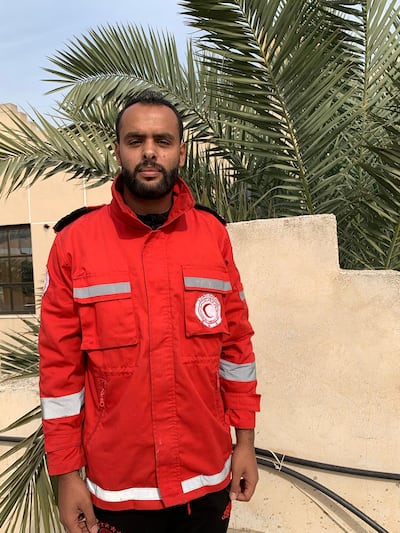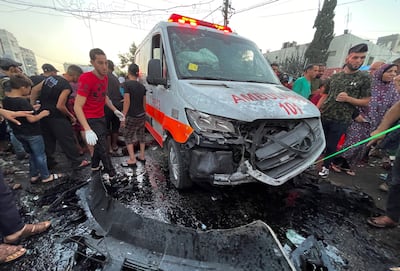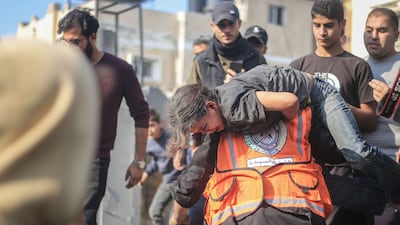Live updates: Follow the latest news on Israel-Gaza
First responders in Gaza said they are determined to keep saving lives as more than two months of war takes a severe physical and emotional toll.
Volunteer rescue teams, medics and ambulance crews are operating under constant risk of being killed in Gaza, where at least 286 health workers are among the more than 18,000 Palestinians killed since the outbreak of the war on October 7.
With almost 50,000 people injured and fighting continuing to rage, first responders are struggling to cope with the scale of the suffering.
Speaking to The National, volunteers spoke of sights of death and destruction "beyond imagination", and the emotional pain of family, friends and colleagues being killed.
“From the first week of the war, the number of wounded and dead was beyond my imagination. I was not expecting to see what I saw nor did I know how to deal with such a situation,” volunteer rescuer Hani Abou Khossa told The National.
Mr Abou Khossa volunteered with the civil defence in Gaza city, then in Al Quds Hospital in northern Gaza, before being displaced to Khan Younis, where he is now stationed.
He said the situation in Khan Younis is just as difficult as in Gaza city but he remains committed to saving lives.
“The army has taken control of the area. There are places that we cannot reach. It is the same as what happened in Gaza [city],” he told The National.
“We try as much as we can to save as many lives with the resources that we have to respond and save lives."

Mr Abou Khossa has embarked on several missions back to the north of the Gaza Strip in co-ordination with UNRWA, the UN agency for Palestinian refugees, to transfer injured people to Nasser Hospital in the south, after Israeli troops effectively split the enclave in two.
Communications between the north and south of the enclave are difficult due to communications blackouts.
“There is almost no communication with first responders in the north of Gaza," said Amer Abou Jomayza, 34, a volunteer rescuer and dispatcher with the Palestine Red Crescent Society in Khan Younis.
"We are only able to communicate with our teams there every few days due to disruption to field radios. We struggle to get in contact with them to ask for information or even to check on them.
"They have no mobile service and no electricity,” he told The National.
Mr Abou Jomayza said work to collect and document casualties from other medical facilities has been compromised due to repeated telecoms blackouts since October 27.
“Our headquarters in Gaza city is no longer operational, while the telecommunications blackout has hindered contact with our teams in Deir al Balah, central Gaza Strip, and in Rafah farther to the south,” he said.

Al Ahli Hospital strike 'etched in memory'
Many first responders have found themselves at medical centres that have come under attack. According to the UN Office for the Co-ordination of Humanitarian Affairs (OCHA), only 14 of Gaza's 36 hospitals are currently operating, with limited services.
Mr Abou Khossa was dispatched to the Al Ahli Baptist Hospital after it was struck by a missile on the night of October 17. At least 471 people were killed, including children. “I stood there, paralysed, not knowing who to save or where to start," he said.
"I carried so many victims, most of them were children. There were body parts everywhere. For a moment, as I carried a 13-year-old boy, I thought he was my brother. He wore the same shirt and had the same hair and features.
“When I placed his body in the ambulance, I just sat for a moment and cried,” he added, his voice trembling.
“It is etched in my memory. I will remember it today, tomorrow and 100 years from now.”
After the medical staff and internally displaced people were allowed to leave the hospital to the south through a safe corridor, Mr Abou Khossa said they placed the patients, critically injured and elderly in ambulances and trucks.
Those more physically able walked for more than an hour in the rain and mud until they reached a military checkpoint, where they were stopped and searched before being allowed to cross into the south, arriving in Khan Younis late at night.
“I am staying here until this crisis is over,” he said.
Mental and physical toll
At least 57 ambulances have been damaged during the war, according to the Ministry of Health in Gaza, with first responders at risk of death or injury as they carry out their work.
Hundreds of medical staff have been killed, leaving first responders to cope with the mental toll of also losing colleagues.
“The most difficult thing that happened during the first week of the war was losing a dear friend and colleague Hatem Awad," Mr Abou Khossa said. "I saw him for a few minutes before he went on a rescue mission. I told him goodbye and we joked before left.”
Soon after, Mr Abou Khossa said he heard a rescuer on the field radio screaming Awad’s name. The team drove to the site of the attack and found their friend lying on the ground.
He had shrapnel lodged in his chest and died of his wounds before reaching hospital. “This incident deeply affected us all. On the same day, we lost three other responders in Jabaliya refugee camp and we became very scared,” he added.

Mr Abou Jomayza said he had lost at least eight members of his family, as well as colleagues, in Israel air strikes.
“We ask everyone to ensure the protection of the medical corps, especially first responders and ambulance drivers,” he said.
“The things that we are seeing, especially the medical staff, and the loss of our loved ones has had a deep effect on us. We are unable to focus on our work,” said Mr Abou Joumayza.
“My mind is always preoccupied with thoughts of losing more people, especially that we are unable to reach our relatives to check on them."
“We are tired. Everyone is tired. I work from 6am until 1am. I only take a break for a few hours and sometimes I cannot even do that. We are waiting for a permanent ceasefire.”
This article is published in collaboration with Egab.

